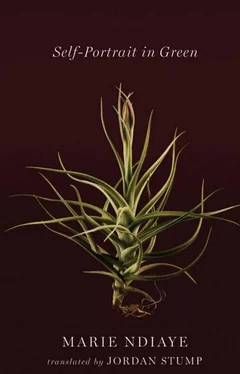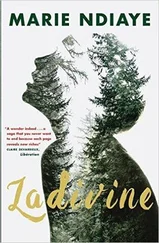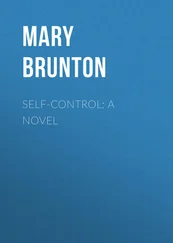* * *
March 20, 2001 — Sorrow and bad luck protect her, in a sense. I go and see her at her parents’, in that damp, desolate countryside, and I notice they dare make no demands on her, despite their authoritarian ways. She’s kind and gentle and so bleached as to not seem real. The sight of my children is painful to her. It was a cruel mistake to bring them. In hopes of warding off who knows what disasters, she continually lifts one hand to her hair, the gesture now spasmodic and unthinking. In spite of it all, in spite of the pain, the shrinking prospects, I tell myself: Oh, she’ll come through this all right.
* * *
March 29, 2001 — Out for a walk, she happened to run into Ivan, and since Ivan and Jenny had had a love affair in the distant days when Jenny still lived in this countryside, now Jenny suddenly finds herself sitting at Ivan and Ivan’s wife’s table, now she’s been invited to share their lunch, in the company of several hearty young men, young adults bursting with health and beauty, who are their sons, and now Jenny’s feeling dazed in the midst of this whole and resplendent family, now she’s wondering if she’s not at this moment in her own private dream, witnessing the wonderful life she could have led had she stayed in her parents’ village. Because if she had, Jenny doesn’t doubt for a moment, she would surely have lived with Ivan, and, remembering her very deep love for him and his passion for her, she shivers with a newborn pain, another pain atop all the sorrows already besetting her, along with a fresh sort of perplexity as it suddenly strikes her as unthinkable that she, Jenny, should find herself in the woeful situation that she does in fact seem to be in, her, Jenny, whom fortune had graced with gifts and skills, she who had always enjoyed such an abundance of choices.
Ivan is sitting across the table from her, and Jenny conceals her lostness behind a pathetic smile, all the while thinking: How he’s aged. And she knows perfectly well that he’s looking at her and thinking: How she’s aged. And then, Jenny tells herself, Ivan can look at the boys that surround them, who are the picture of perfectly successful human beings, and muse that it’s worth growing older to revel in that perfection, that success; but for Jenny, where can she look to find this delight in growing older? Where can she look?
* * *
March 30, 2001 — On the telephone, she tells me at some length that her love affair with Ivan lasted several years before she decided to leave the province, and in spite of the distance between us I can picture her hard face and clenched jaw, because I hear a cold, brittle voice that isn’t usually Jenny’s, a voice she’s forcing herself to adopt, I think, so as to keep sentimentality at bay. Jenny is not a sentimental woman. Isn’t it a sign of contemptible self-indulgence, Jenny’s thinking, to be caught up in a romanticism you never felt when you were young, simply because you have too much time on your hands, and because, in any event, giving into that romanticism now poses no threat, since everything that matters in life lies well behind you? Certainly, Jenny is thinking, belated romanticism is pitiful, pathetic, mediocre. But how to fight it off? Jenny doesn’t ask me, but I can’t help inwardly posing that question for her: how to fight it off, yes, how to remain sincerely cold and detached, when as it happens Ivan’s face is now never far from her thoughts, and not Ivan’s face when he was young and in love with her but Ivan’s face today, creased, placid, and a little weary? How to remain hard, clear-headed, and slightly sardonic when Ivan’s face, which she sees the moment she wakes up and then sees all day long, always appears to her surrounded by the friendly faces of the wife and sons, who inspire in her no trace of jealousy but only a powerful affection and interest, not lessened but heightened by her melancholy? How to fight it off, in the face of such a melancholy? Against melancholy, against regret, common sense and cynicism can do nothing. She regrets not what was, but what should have been, could have been, had she only made some other choice way back then, and she regrets the choice she made, the path of sorrow. Of course, she says nothing of all this. I can feel it from the forced hardness in her voice.
* * *
April 4, 2001 — Now, and only now, I realize that Ivan’s wife is a woman in green. I went back to see Jenny, and while her very amenable parents entertained my children, with that cheerful bonhomie, that ability to find fun in nothing at all that the sternest educators sometimes acquire in their old age (rankling Jenny, who observes: “They were nothing like that when I was little”—but then it was simply impossible for them to be other than they were, because they couldn’t imagine children might be treated in any but the most dramatic and intransigent way), while Jenny’s parents looked after my children, suddenly seeming to believe that their daughter’s troubles in no way forbade them from offering their faces to the first sunshine of spring, in no way forbade them even from forgetting that they had a daughter in difficulty, I went with Jenny for a little stroll in the direction of Ivan’s house, because she wanted me to get a glimpse of them, him and his wife. She described the way Ivan drags greedily on a cigarette, how he closes his eyes and then half opens them to blow out the smoke in little puffs, like sighs, disillusioned; whereas, she told me, Ivan’s wife holds her cigarette at her side, between two delicate fingers, all the while cooking with the other hand. Jenny tells me, I think, that this woman always appears in green — I think she tells me that, and now I don’t want to question her to make sure, for fear I might learn otherwise. Why do I not want to learn otherwise? There’s something dishonorable in that, since as I perceive her Ivan’s wife has no need of a costume to be a woman in green. All the same, Jenny did tell me this woman never let herself be seen in any other color; and this, like her way of just barely clasping her cigarette, her hand close by her hip, forms, along with a welter of similar details, the substance of the charm she exerts on Jenny.
* * *
April 8, 2001 — Increasingly, though it’s Jenny and not me who has problems, I’m the one who calls Jenny, simply for the pleasure of hearing her speak. She goes to Ivan and his wife’s house every morning, when Ivan’s away, in what seems an implicit agreement between the two women. The wife lights a cigarette in front of Jenny, who, never having smoked in her life, having always looked on cigarettes with virtuous horror, can’t imagine that pleasure, and yet now she envies this gesture, and her own, her adorable way of pushing a lock of hair back along one side of her head, now strikes her as trivial, inadequate. Her parents’ fears have come true: she’s losing a part of her dignity, but not for the reasons nor in the circumstances they imagine. She’s forgotten that she’s a woman adrift, alone and abandoned, that no one anywhere feels any need for her, that she was loyal to her profession and that her profession coldly rejected her — all that, which so consumes the two old people’s thoughts, she’s forgotten, and so she’s no longer ashamed. But before Ivan’s wife she’s tormented by the sort of disdain that she feels for herself, for her physical person, her own insignificance. The woman in green humbles her, not deliberately, unaware that she’s doing it — and if she did know it and want it, Jenny would never let it happen.
* * *
April 10, 2001 — Repeatedly questioned, with no attempt on my part to conceal my burning curiosity, Jenny revealed what the two of them discuss in her daily visits. Ivan’s wife does the talking. She lights a first cigarette, silently and slowly, sits down in an armchair, crosses her legs, and, with her cigarette always about to slip from between her index and middle fingers, tells Jenny of the life Jenny would have lived had she spent it with Ivan, her first, overpowering love. Surprised, I ask:
Читать дальше












